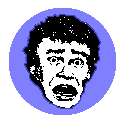In the spirit of Oliver Sacks, Siegel draws on his reasearch as a neuropsychiatrist to relate these “Clinical Tales of Hallucination.” The case studies include experiences with visionary drugs, dreams, imaginary companions, and life-threatening crises. They are quite engaging, even if spruced up a bit for the sake of a good story. While leaving room for speculation about the mysteries of the human mind, Siegel’s psychiatric background compels him to overemphasize the unreality of hallucinations. His quick distinction between “false” and “real” impressions would no doubt exasperate philosophers of consciousness, but then he doesn’t go as far as to deny that hallucinations can serve a definite, even positive purpose. In the end, he neither dismisses nor sympathizes, but tends to leave the ‘meaning’ of the tales provocative and open-ended. [New York: Penguin]
